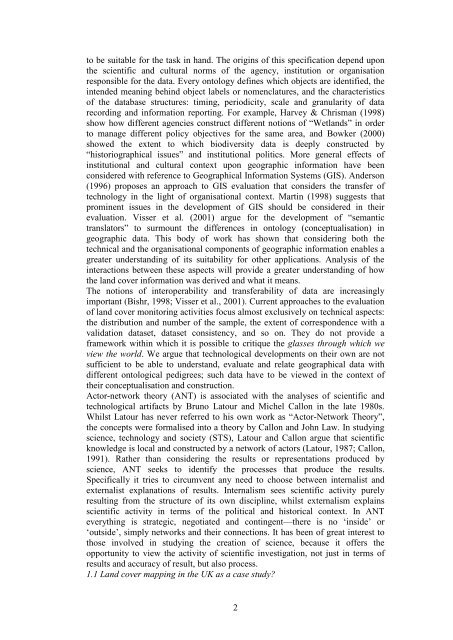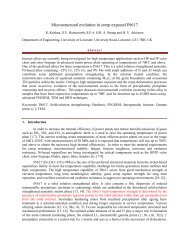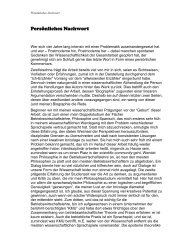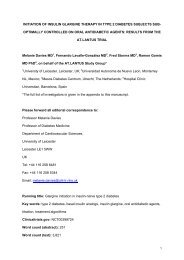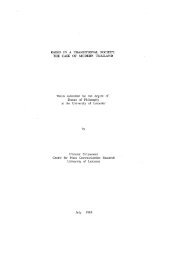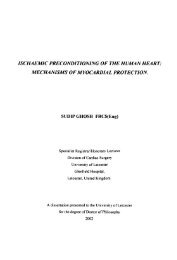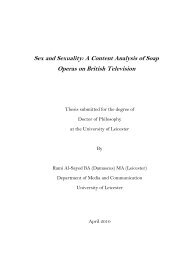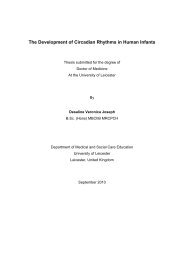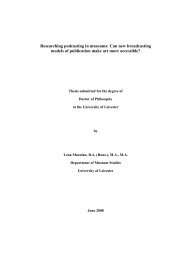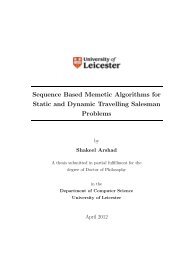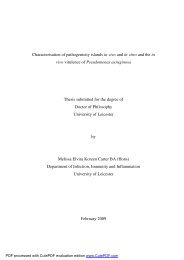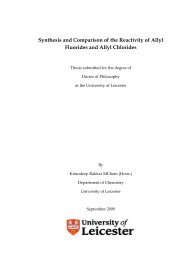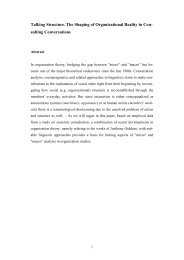Actor Network Theory - Leicester Research Archive - University of ...
Actor Network Theory - Leicester Research Archive - University of ...
Actor Network Theory - Leicester Research Archive - University of ...
You also want an ePaper? Increase the reach of your titles
YUMPU automatically turns print PDFs into web optimized ePapers that Google loves.
to be suitable for the task in hand. The origins <strong>of</strong> this specification depend upon<br />
the scientific and cultural norms <strong>of</strong> the agency, institution or organisation<br />
responsible for the data. Every ontology defines which objects are identified, the<br />
intended meaning behind object labels or nomenclatures, and the characteristics<br />
<strong>of</strong> the database structures: timing, periodicity, scale and granularity <strong>of</strong> data<br />
recording and information reporting. For example, Harvey & Chrisman (1998)<br />
show how different agencies construct different notions <strong>of</strong> ―Wetlands‖ in order<br />
to manage different policy objectives for the same area, and Bowker (2000)<br />
showed the extent to which biodiversity data is deeply constructed by<br />
―historiographical issues‖ and institutional politics. More general effects <strong>of</strong><br />
institutional and cultural context upon geographic information have been<br />
considered with reference to Geographical Information Systems (GIS). Anderson<br />
(1996) proposes an approach to GIS evaluation that considers the transfer <strong>of</strong><br />
technology in the light <strong>of</strong> organisational context. Martin (1998) suggests that<br />
prominent issues in the development <strong>of</strong> GIS should be considered in their<br />
evaluation. Visser et al. (2001) argue for the development <strong>of</strong> ―semantic<br />
translators‖ to surmount the differences in ontology (conceptualisation) in<br />
geographic data. This body <strong>of</strong> work has shown that considering both the<br />
technical and the organisational components <strong>of</strong> geographic information enables a<br />
greater understanding <strong>of</strong> its suitability for other applications. Analysis <strong>of</strong> the<br />
interactions between these aspects will provide a greater understanding <strong>of</strong> how<br />
the land cover information was derived and what it means.<br />
The notions <strong>of</strong> interoperability and transferability <strong>of</strong> data are increasingly<br />
important (Bishr, 1998; Visser et al., 2001). Current approaches to the evaluation<br />
<strong>of</strong> land cover monitoring activities focus almost exclusively on technical aspects:<br />
the distribution and number <strong>of</strong> the sample, the extent <strong>of</strong> correspondence with a<br />
validation dataset, dataset consistency, and so on. They do not provide a<br />
framework within which it is possible to critique the glasses through which we<br />
view the world. We argue that technological developments on their own are not<br />
sufficient to be able to understand, evaluate and relate geographical data with<br />
different ontological pedigrees; such data have to be viewed in the context <strong>of</strong><br />
their conceptualisation and construction.<br />
<strong>Actor</strong>-network theory (ANT) is associated with the analyses <strong>of</strong> scientific and<br />
technological artifacts by Bruno Latour and Michel Callon in the late 1980s.<br />
Whilst Latour has never referred to his own work as ―<strong>Actor</strong>-<strong>Network</strong> <strong>Theory</strong>‖,<br />
the concepts were formalised into a theory by Callon and John Law. In studying<br />
science, technology and society (STS), Latour and Callon argue that scientific<br />
knowledge is local and constructed by a network <strong>of</strong> actors (Latour, 1987; Callon,<br />
1991). Rather than considering the results or representations produced by<br />
science, ANT seeks to identify the processes that produce the results.<br />
Specifically it tries to circumvent any need to choose between internalist and<br />
externalist explanations <strong>of</strong> results. Internalism sees scientific activity purely<br />
resulting from the structure <strong>of</strong> its own discipline, whilst externalism explains<br />
scientific activity in terms <strong>of</strong> the political and historical context. In ANT<br />
everything is strategic, negotiated and contingent—there is no ‗inside‘ or<br />
‗outside‘, simply networks and their connections. It has been <strong>of</strong> great interest to<br />
those involved in studying the creation <strong>of</strong> science, because it <strong>of</strong>fers the<br />
opportunity to view the activity <strong>of</strong> scientific investigation, not just in terms <strong>of</strong><br />
results and accuracy <strong>of</strong> result, but also process.<br />
1.1 Land cover mapping in the UK as a case study?<br />
2


